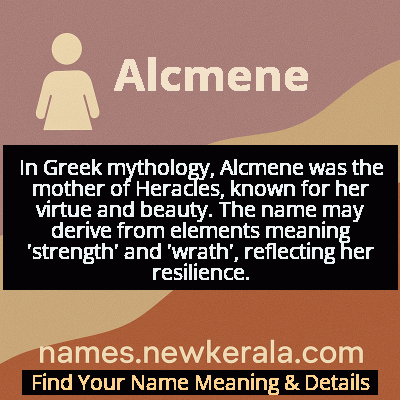Alcmene Name Meaning & Details
Origin, Popularity, Numerology Analysis & Name Meaning of Alcmene
Discover the origin, meaning, and cultural significance of the name ALCMENE. Delve into its historical roots and explore the lasting impact it has had on communities and traditions.
Name
Alcmene
Gender
Female
Origin
Greek
Lucky Number
8
Meaning of the Name - Alcmene
In Greek mythology, Alcmene was the mother of Heracles, known for her virtue and beauty. The name may derive from elements meaning 'strength' and 'wrath', reflecting her resilience.
Alcmene - Complete Numerology Analysis
Your Numerology Number
Based on Pythagorean Numerology System
Ruling Planet
Saturn
Positive Nature
Ambitious, efficient, realistic, and authoritative.
Negative Traits
Materialistic, stressed, confrontational, and can be overly ambitious.
Lucky Colours
Dark blue, black.
Lucky Days
Saturday.
Lucky Stones
Blue sapphire, amethyst.
Harmony Numbers
2, 4, 6.
Best Suited Professions
Business leaders, managers, financial services, law enforcement.
What People Like About You
Leadership, determination, organizational skills.
Famous People Named Alcmene
Alcmene of Greek Mythology
Mythological Figure
Mother of Heracles (Hercules) through Zeus, known for her exceptional beauty and virtue
Alcmene (Literary Character)
Fictional Character
Featured in numerous classical works including plays by Euripides and modern retellings of Greek myths
Alcmene (Astronomical Reference)
Mythological Namesake
Name used in astronomical contexts and scientific literature referencing Greek mythology
Name Variations & International Equivalents
Click on blue names to explore their detailed meanings. Gray names with will be available soon.
Cultural & Historical Significance
Throughout classical literature, Alcmene appears in numerous works including Hesiod's 'Shield of Heracles', Euripides' lost play 'Alcmene', and various Roman adaptations. Her character served as a moral exemplar while also highlighting the precarious position of mortals in their interactions with gods. The dramatic tension in her story - particularly Zeus's deception by taking Amphitryon's form - became a popular theme in later European literature and drama, influencing works from the Renaissance through modern times. Her legacy extends beyond mythology into psychology, where the 'Alcmene complex' describes situations involving mistaken identity or dual paternity.
In artistic representations, Alcmene has been depicted in countless vase paintings, sculptures, and later oil paintings, often shown in the moment of Heracles' birth or during Zeus's visitation. These artistic interpretations reflect changing cultural attitudes toward femininity, divinity, and marital relationships across different historical periods, making Alcmene not just a mythological figure but a cultural barometer of evolving social values.
Extended Personality Analysis
Individuals named Alcmene are often perceived as possessing a unique blend of strength and grace, reflecting their mythological namesake's dual nature as both mortal and mother to a demigod. They typically exhibit remarkable resilience in facing challenges, combined with a deep sense of loyalty to family and principles. Like the mythological Alcmene who maintained her virtue despite extraordinary circumstances, modern Alcmenes often demonstrate strong moral compasses and the ability to navigate complex situations with wisdom and dignity. Their personality often includes a quiet determination that others might underestimate until faced with their unwavering resolve.
Common traits associated with the name include maternal protectiveness, intellectual depth, and an innate elegance that commands respect without seeking attention. Alcmenes tend to be strategic thinkers who consider multiple perspectives before acting, much like their namesake who had to navigate the complicated dynamics between her mortal husband and divine lover. They often possess a mysterious quality that draws others to them, combined with practical wisdom that makes them excellent advisors and confidantes. While they may appear reserved initially, those who earn their trust discover fiercely loyal companions who will defend their loved ones with the same determination Alcmene showed in protecting her divine son.
The name also suggests someone who understands the balance between strength and compassion, able to be both formidable when necessary and nurturing when called for. This duality makes Alcmenes particularly adept at leadership roles where both authority and empathy are required. They often display remarkable patience and the ability to see long-term consequences, qualities that served their mythological counterpart well in raising the greatest hero of Greek mythology.
Modern Usage & Popularity
In contemporary naming practices, Alcmene remains an exceptionally rare choice, typically selected by parents with strong interests in classical mythology, literature, or history. The name's usage is most common among academic families, classical studies enthusiasts, and those seeking a truly distinctive name with profound historical roots. While it doesn't appear on mainstream baby name charts in English-speaking countries, it maintains a quiet presence in Greece and among the Greek diaspora, where mythological names enjoy greater acceptance. Recent years have seen a slight increase in usage coinciding with the popularity of mythological names like Persephone, Athena, and Orion, though Alcmene remains far less common than these examples. The name's complexity and strong mythological associations make it a bold choice that often reflects parents' desires to give their daughter a name with intellectual depth and cultural significance rather than following naming trends.
Symbolic & Spiritual Meanings
Symbolically, Alcmene represents the profound concept of mortal vessels containing divine potential, embodying the idea that extraordinary significance can emerge from seemingly ordinary circumstances. Her name carries deep connotations of hidden strength, unwavering maternal devotion, and the transformative power that arises when love and duty intersect with destiny. The mythological narrative positions her as the crucial link between heavenly and earthly realms - while she herself was mortal, she became the conduit through which divine power entered and transformed the human world. This makes the name powerfully symbolic of latent potential and the often-overlooked truth that world-changing significance can manifest through supporting roles as well as leading ones. The 'strength' element inherent in her name's etymology connects to both physical endurance and moral fortitude, suggesting an inner resilience capable of withstanding extraordinary challenges and moral complexities. Furthermore, her story serves as a rich metaphor for the intricate dance between fate and free will, as she navigated circumstances largely beyond her control while steadfastly maintaining her personal integrity and moral compass.

